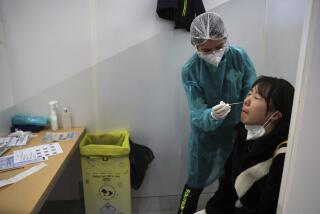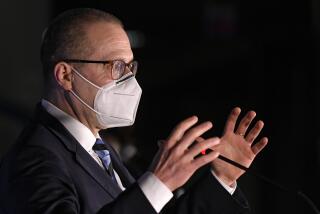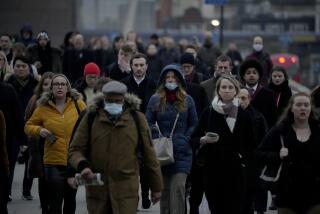A year into COVID-19 pandemic, Europe struggles amid emerging variants, vaccine delays
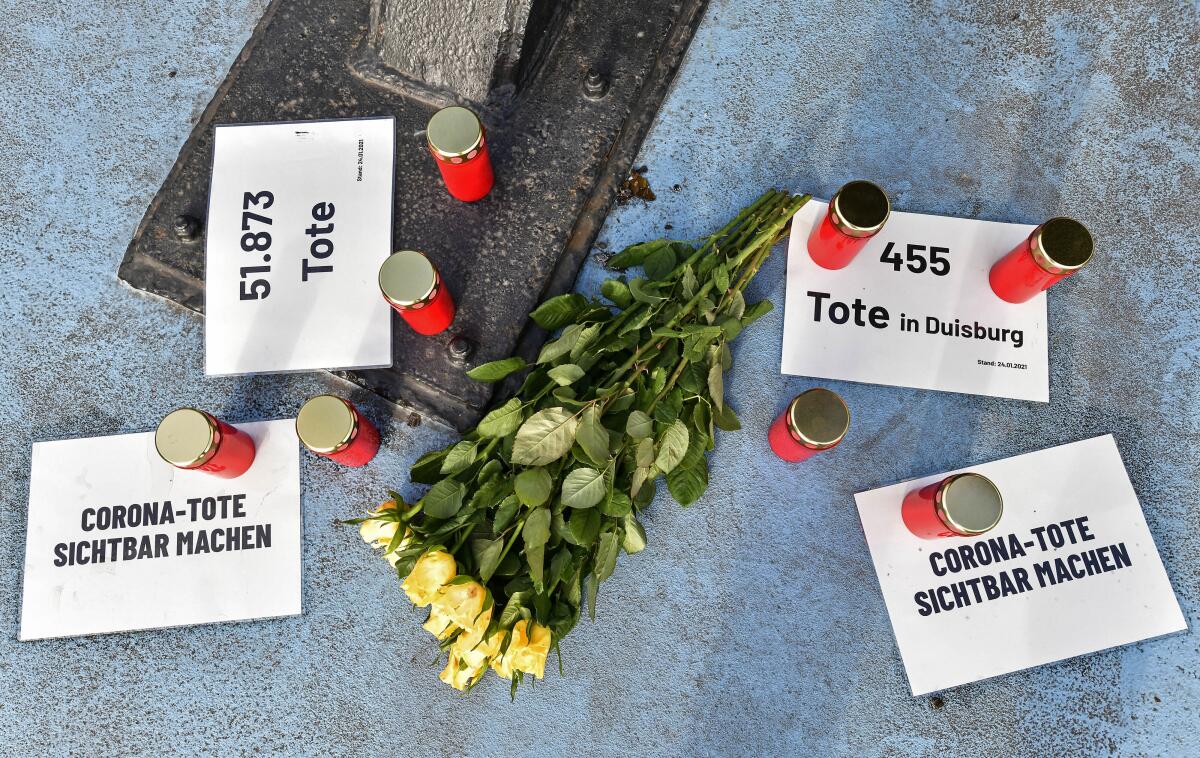
LONDON — A year after COVID-19 began its devastating march across Europe, reversals of fortune, political quarrels and vexing public-health paradoxes are complicating efforts to contain a deadly third wave of contagion.
Germany, widely touted as a success story last year in the outbreak’s initial months, is struggling with a sluggish vaccine rollout, soaring deaths and widespread discontent, while Britain, whose early coronavirus response was criticized as haphazard, has inoculated more than a fifth of its population.
France is watching with alarm as a new variant gains a foothold in the country’s east. In Italy, ravaged in the pandemic’s early months, a new government is raising hackles with the prospect of tightened health measures. Portugal, which fared relatively well last year while the caseload soared in neighboring Spain, now has one of the world’s highest coronavirus death rates.
Across Europe, strict lockdowns have been credited in several nations with driving down transmission of the virus — but at the same time, public resistance to such restrictions is sharpening, sometimes spearheaded by far-right groups. And the 27-nation European Union has surpassed the unfathomable tally of half a million coronavirus deaths.
Amid a dark winter, some bright spots have emerged. Britain said last week it had given first doses of the vaccine to 15 million people — more than 20% of the population. Prime Minister Boris Johnson, who suffered a life-threatening bout of COVID-19 last year, called the rollout an extraordinary national achievement, although he coupled that with a warning that difficult times still lie ahead.
“We must be both optimistic, but also patient,” Johnson said at a news conference last week.
For many in Britain, the brisk pace of mass inoculation marks a cheering turnabout from early stumbles. The country began its vaccine program in December, three weeks before vaccine regulatory approval occurred in the EU, which Britain exited in early 2020. Since the rollout’s start, Britain has been meeting its own ambitious vaccination benchmarks, beginning with its most vulnerable populations.
At the same time, though, Britons are chafing under the third lockdown of the pandemic, now heading into its eighth week. Schools are closed and people have been told not only to work from home if possible, but to avoid going out for any reason. Bars and pubs have closed their doors, stores have been shuttered if their wares are deemed nonessential, and restaurants offer takeout only.
June Ingham, a 73-year-old Londoner who received her first dose on Feb. 1, was full of praise for the “amazing” vaccine rollout, but longed for a more widespread sense of safety.
“What you want is a hug,” she said. “I want one of those — that’s all you want.”
Britain’s caseload, while easing, remains dire, with more people hospitalized than at the peak of the first wave, in April. But facing a growing clamor to reopen, Johnson promised a road map for easing restrictions.
Britain — itself the source of a coronavirus strain that has spread around the globe — took a dramatic step to stem the spread of variants from places like South Africa and Brazil. Starting last week, travelers arriving from dozens of countries deemed dangerous hot spots for variants have been required to check into government-designated hotels for a 10-day quarantine, at a cost of almost $2,500 to solo travelers, and even more for couples or families.
In Germany, there has been an ominous spike in infections and deaths since the fall, a grim turnabout to its initial achievements in containment of the virus. Politics played a role; powerful state governors resisted attempts by Chancellor Angela Merkel and the federal government to impose restrictions across larger sectors of the economy.
Although the scientifically trained Merkel last year won praise for her government’s handling of the crisis, the vaccine rollout has lagged notably. As of Wednesday, Germany had vaccinated only 5% of its population of 83 million, lagging well behind Britain, with 22% having received at least one dose, and the United States, where that number is about 12%.
The painfully slow start has been galling for many because a German-based company, BioNTech, helped develop the first vaccine, together with pharmaceutical giant Pfizer. And in a country that prides itself on organizational prowess, logistical delays are also a particular source of frustration.
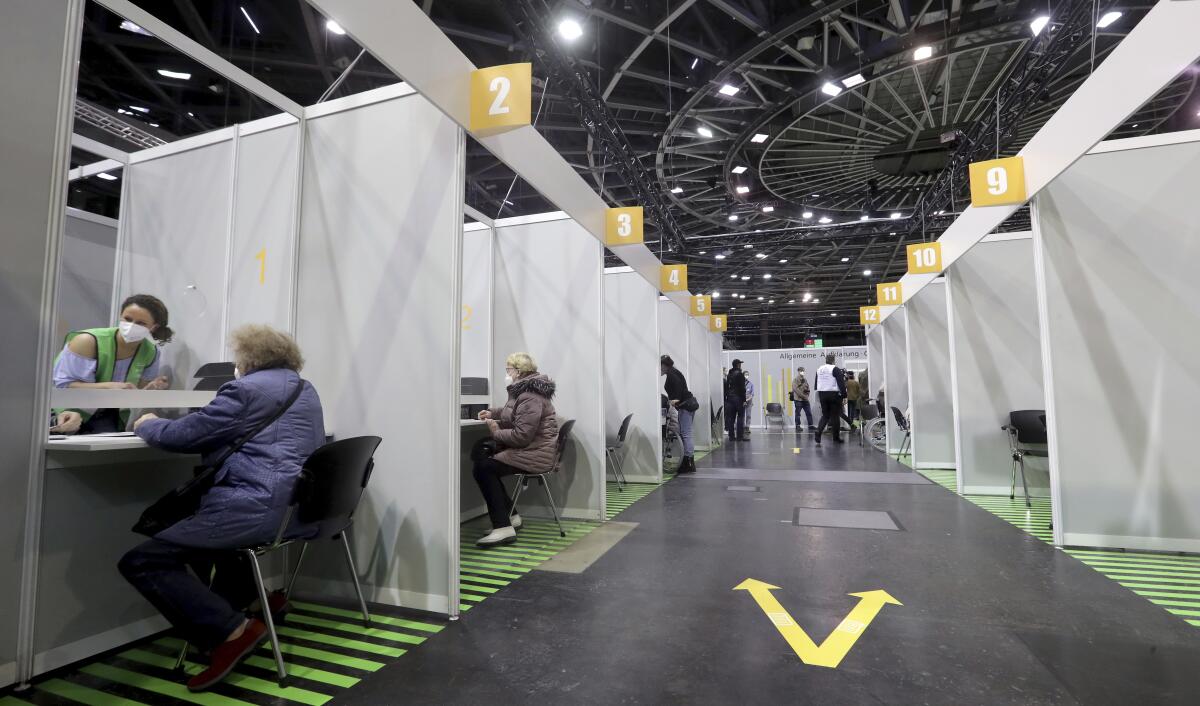
The European Union negotiated vaccine procurement on behalf of all the bloc’s members, including Germany. But it didn’t place its order until November, while the United States and the United Kingdom made their purchases in July.
Back in December, Germany’s health minister, Jens Spahn, touted the EU’s “orderly approval process,” but by this month, both German and European officials were on the defensive, with critics charging that misguided frugality had prevented more aggressive advance purchases.
“The virus is the enemy — not the EU, not the federal government, not the states and not the pharmaceutical companies,” Spahn said in a testy recent TV interview. “We all have a responsibility to do more.”
In a move seemingly intended to quell some of the criticism and prevent further deterioration, the EU announced Wednesday it would buy 300 million doses of the Moderna vaccine to supplement existing supplies, and unveiled plans to spend nearly $300 million to combat the spread of new variants on the continent.
The German government has pledged to offer a vaccine to anyone who wants it by late September, but in the meantime, the mood is bleak. The country has been in a comprehensive lockdown since December, which is set to run until at least March 7.
Because of the lag time between infections and deaths, the restrictions failed to head off a surge in fatalities. In mid-December, coronavirus deaths in Germany had not yet reached 25,000, but by last week they exceeded 67,000.
Toni Schlegel, a 60-year-old operator of five idled restaurants and a beer garden in the southwestern college town of Freiburg, said he was surprised and disappointed with the government, saying it has badly bungled the vaccination rollout. He said it took him hundreds of phone calls to a government hotline, and dozens of failed attempts online, to secure a vaccine appointment in April for his 86-year-old mother.
“So many mistakes have been made,” Schlegel said. “It’s hard to believe how much has gone wrong.”
Neighboring France, too, is uneasy. With more than 83,000 deaths to date, President Emmanuel Macron has sought to avoid a new lockdown, though an overnight curfew has been in place since mid-December.
In France’s eastern Moselle region, where cases propelled by a virus variant have been rising quickly, the prefectural government has been at odds with municipal officials who want a local lockdown.
Echoing a pattern of skirmishes across the continent, a confrontation over a government-ordered overnight curfew, which at one point sparked riots, played out in courts last week in the Netherlands. A group skeptical of preventive measures — Viruswaarheid, or Virus Truth — won an order to lift the curfew, but an appeals court intervened to reinstate it.
Back in Germany, Heike Soujon, a 58-year-old physician’s assistant in the central town of Helsa, said no one in her medical office had yet been given an opportunity to be vaccinated, even though an average of two of the practice’s patients a day test positive for the coronavirus.
“Believe me, it doesn’t feel good at all,” she said. “We’re scared. We’re all disappointed that it’s taken so long. There’s no hope on the horizon yet, either.”
Special correspondents Boyle and Kirschbaum reported from London and Berlin, respectively. Times staff writer King in Washington contributed to this report.
More to Read
Sign up for Essential California
The most important California stories and recommendations in your inbox every morning.
You may occasionally receive promotional content from the Los Angeles Times.
